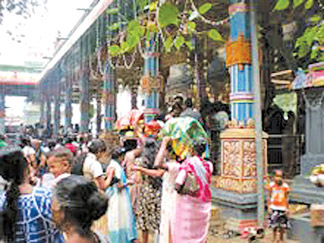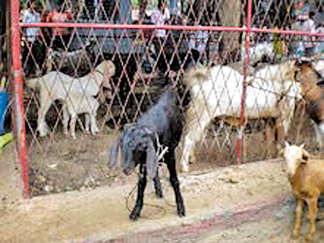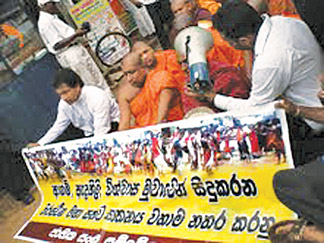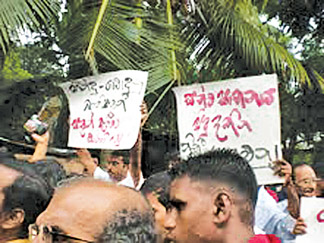Hinduism opposes animal sacrifice
By Thulasi MUTTULINGAM
The road that leads to the Bathrakali Amman Temple Muneshwaram had a
festive, carnival air about it on Wednesday, August 25. Stalls selling
everything from pots and pans to footwear, clothes, pictures and idols
of various deities as well as ice-cream vans are to be found dotting
both sides of the road.

The Bathrakali Amman Muneshwaram Kovil |

Goats to be slaughtered |
The side lane leading to the temple is filled with stalls selling
various snacks as well as pictures of deities. Crowds throng the lane as
well as the temple inside. A carnival atmosphere pervades the place with
young children running about laughing and people seated on blankets,
seemingly having a good time.
The only thing that mars the picture is the spectacle every so often
of fowls being brought in (often upended and swung by the legs) or goats
being led in. From big billy goats to small kid goats, the animals and
chicken being brought in is a regular spectacle - it is the last day of
the month long festival at the temple and the grand culmination will be
with the mass slaughter of animals to be shared amongst all the
temple-goers.
The Bathrakali Amman Temple is one of the few remaining Hindu temples
in Sri Lanka to practise animal sacrifice. It is by no means a facet of
the mainstream religion as it is practised in the country today. Many
Hindus today are vegetarians and those who do eat meat, generally
abstain from going to temples on those days due to the belief that
they've committed a sin and that they would defile the temple if they
were to enter it. Unlike in other religions, there is no hard and fast
rules for fasting in Hinduism; the one concrete rule stipulates that the
diet, if any should be hundred percent lacto vegetarian. Dairy products
are allowed but eggs, fish and meat are not.
Evolution
As an ancient religion whose roots are lost in obscurity, Hinduism
did once practise animal sacrifice and meat eating extensively but it
has been many centuries since it evolved away from it and took up the
precept of Ahimsa or non-violence towards all living beings.
According to the Director of the Department of Hindu Religious and
Cultural Affairs, Shanthi Navukarasan, they are ardently opposed to
these types of sacrifices in Hindu Kovils in the name of Hinduism but
are unable to do anything because there is no specific law prohibiting
it.
"We had several meetings with the priests of the Bathrakali Amman
Temple, but they insisted that it is an age-old custom that they have to
continue. We are still engaged in talks with them to at least stop the
sacrifices for the next year, that is the best we can do for the
moment," she said.

The clergy and the laity protest against the practice |

The protestors |
Animal Rights activists however insist that there is already a law in
place to prohibit such slaughter of animals in public places. According
to Dr. Chamith Nannayakara of the Association of Veterinarians for the
Humane Management of Animal Population, the temple authorities not only
violated the law by killing animals but also went against other facets
of it which stipulated that slaughter houses were required to have
veterinary surgeons as well as Public Health Inspectors on stand by,
before, during and after the slaughter.
"The law requires that a veterinary surgeon should do both an ante
mortem and a post mortem on the animal to ensure both its health and its
humane slaughter and a public health inspector should be on stand by to
certify the process. The temple authorities violated this rule as well,"
he said.
Dr. Nanayakkara was part of a group of animal rights activists who
protested the mass slaughter of the goats and chickens at the temple
premises. However, the protest was not allowed to take off. The Buddhist
monks who were supposed to lead the protests were prevented from
entering the temple premises. Though police personnel on the premises
had initially said photography was allowed, the situation quickly became
tense and those identified as protestors were told not to take pictures
and to leave. Not even the media was allowed to cover the event.
The protest was to be a peaceful one and the protestors had already
registered with the local police, notifying them that a protest would
take place on the stipulated day. However, the temple authorities had
obtained a court order from the local magistrate, prohibiting all such
demonstrations in the temple precincts. And so the monks who were to
lead the protests were prevented from entering the temple. They had to
contend with staging their protest a few feet away from the temple
gates.
This particular temple has long been famous for animal sacrifices but
for some time in the previous years, the slaughter had not been carried
out because of the agreement between a Buddhist monk of the neighbouring
pansala and the temple priest.
Apparently, the monk had done a personal favour to the priest by
appearing as his witness over a court case he was facing over land
issues for the temple.
In return the monk asked for the cessation of the annual animal
sacrifice which the priest agreed to. However, the monk passed away a
couple of years ago and soon after, the priest did too. The new priest
has now reinstated the custom as of last year. He has gone on record as
saying that it is an age-old custom that he as well as the local people
believe in and they have seen the benefits of it; they therefore see no
need to discontinue it.
It is not only the local Tamil Hindu population that patronise the
temple and take part in its sacrificial rituals, the Sinhalese, and
elements of the catholic population do so too.
Belief
The belief is that the Kali amman can be appeased with one life in
place of another and so if the astrologer says someone is in mortal
danger, the way to get out of it is to offer a goat or chicken to the
goddess instead. People also use the sacrifice to persuade the goddess
to avenge them against those who have done some harm to them or to rid
themselves of what they believe to be black magic or possession.
A local Sinhala catholic man, married to a Tamil Hindu woman says he
doesn't think the sacrifice is a good thing but adds "You know, during
President Premadasa's time, they stopped it for a brief while but then a
lot of accidents happened around here." According to him, the person
slaughtering the goats is paid Rs. 1000 per goat but nevertheless
slaughters the animals quite a few inches below the neck line.
"The policy" he says, "is to give the meat to the family that brought
it and throw away the heads. By severing the neck thus, the man ensures
he has some meat of his own to sell. It's a pity really. For days
afterwards, this place will stink of blood."
Three Tamil men who have travelled from Colombo are of a different
opinion. "This is something that happens regularly after all," they
shrug. "Isn't human life more important than animal life? If the
astrologer was to tell you that your child would die soon unless you
sacrificed a goat, wouldn't you rather do that?"
Pressed if this is what they believe to be in keeping with Hinduism,
they smile sheepishly. "You are right, it is a pity to kill so many
animals but then ask the Goddess why! Let her come down herself and tell
us to stop, that she doesn't want sacrifices anymore. That's the only
way this will stop."
The mainstream Hindu religions community however, distanced
themselves from these happenings or openly condemn them. According to
the president of the All Ceylon Hindu Congress, V. Kailasapillai, his
organization not only opposed the sacrifices but had done all it could
to stop it.
"We held a press conference along with the buddhist clergy to bring
about awareness of this issue and even asked the local IGP to stop the
sacrifice, but it was of no avail," he said.
|

